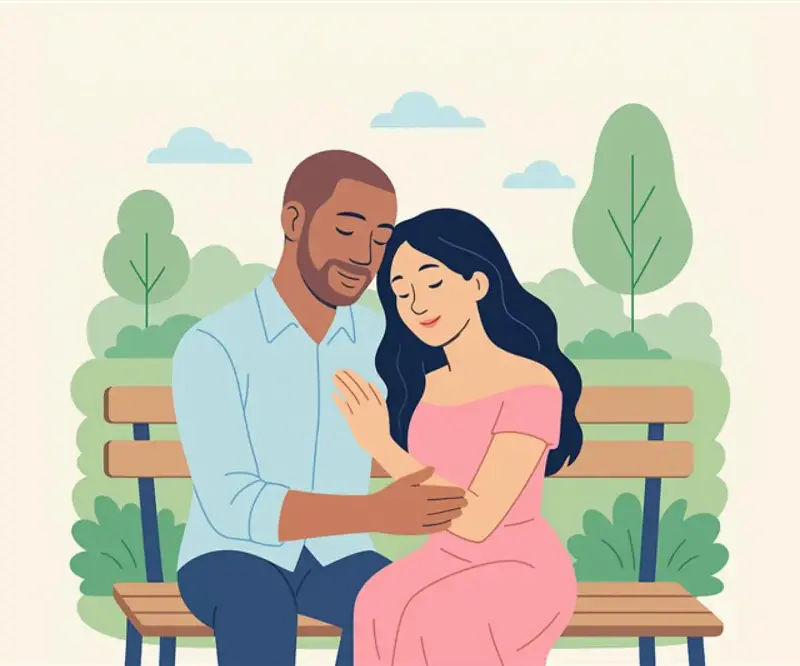
When couples walk into Dina Chavira's therapy room, she often sees the emotional wear of unspoken needs and unresolved tensions. But among the happiest, something else shows—effortless habits that nurture emotional intimacy without the couple even realizing they are doing it.
"Disagreements are a natural part of close relationships due to the diversity of human experiences and perspectives," Chavira, a licensed clinical psychologist and founder of VastMind Wellness, PLLC, told Newsweek. "How conflict is handled, however, is a make-or-break factor for couples.
"Happy couples tend to bring up conflict gently, take time outs before things get heated, and return to discuss the issue when both are ready."
These patterns are not grand gestures, Chavira said. Rather, they are subtle rituals—emotional reflexes built through mutual care and understanding.
Chavira and fellow therapist Amy Bishop, who has specialized training in couples work, outlined the five foundational behaviors they have observed in the best partnerships that walk through their practice doors.
1. They Handle Conflict Gently
Rather than igniting arguments with blame or escalation, happy couples approach disagreements softly, almost instinctively.
Chavira refers to this as "gentle conflict," when issues are addressed calmly, breaks are signaled before arguments spiral, and couples feel comfortable circling back to discuss an issue when if emotionally unprepared.
"These couples also make repair attempts, usually involving sincere apologies, if boundaries are crossed," she said. "It's less about being right and more about preserving the relationship."
Bishop agreed about the importance of gentle conflict resolution and fast repairs.
"Being able to repair quickly makes us feel confident about the resilience of our relationship," she told Newsweek. "Until we feel an argument is resolved by processing or repairing, we hold on to the pain, anxiety, and resentment in our bodies."
2. They Accept Each Other's Bids for Connection
In everyday life, partners often seek subtle forms of connection. These may be a tap on the arm during a favorite TV show, a smile recalling a private joke, or a casual comment about a place that they had once visited and enjoyed.
"Happy couples turn towards these bids by acknowledging them in a positive way—asking questions, making eye contact—rather than turning away or making a critical comment," Chavira said.
Responding to these small moments consistently strengthens the existing emotional bond, helping couples develop their rapport and weather larger future challenges together.
3. They Show Physical Intimacy
Whether it is a lingering kiss or a warm hug after work, touch remains a vital way couples stay connected.
"Happy couples tend to keep the romance alive by engaging in regular physical contact with each other," Chavira said.
Bishop supports this, adding some physiological insight.
"Kissing goodbye for six seconds is a strategy popularized by John Gottman," she said. "Scientifically, a six-second kiss may be long enough for our brain to release extra oxytocin, enhancing our sense of connectedness and bond."
Likewise, a 20-second hug can reset stress levels and attune partners to each other's emotional state.
"It helps us regulate and transition back to the home environment," she added.
4. They Support One Another's Needs
Appreciation is also not accidental—it is deliberate and frequent among the happiest couples.
"This can take many forms," Chavira explained. "From a simple verbal expression—'Thank you for taking out the trash'—to kind gestures like surprising a partner with concert tickets or their favorite coffee."
Bishop added that thriving couples also balance support for each other's goals with the need to express their own.
"They say yes to their partner, and they reach for their own needs," she said.
That might mean offering to take the kids so one partner can attend a book club or asking for a compromise to fit in a shared date night.
"They bring up their needs for support in real-time, and not as a reason to say no to their partner's requests," Bishop continued.
5. They Prioritize Fun and Stay Accessible
According to Chavira, joy is not a luxury in strong relationships—it is essential and something that the happiest couples she has counseled prioritize.
"Positive experiences can mitigate the effects of conflicts and strengthen the couple bond," Chavira said, pointing to further research by Dr. John Gottman that shows healthy couples have a 5:1 ratio of positive to negative interactions.
She also noted that shared novelty enhances relationship satisfaction.
"Research by Aron et al. (2000) showed that couples who engaged in novel and arousing activities experienced an increase in relationship quality that could counteract the natural decline that happens after the honeymoon period," she added.
Equally important is everyday reliability as each others' professional lives become increasingly busy.
"They answer their phones," Bishop said. "There is a sense of security that comes from knowing if you want to reach your partner, they will be available."
This simple act fosters emotional safety and responsiveness in the relationship.
"In the end, these habits aren't extraordinary," Bishop said. "But the couples who practice them—almost without thinking—build a foundation of emotional safety and trust that can carry them through nearly anything."
